九年级英语全册Unit12You’resupposedtoshakehands教案人教新目标版
九年级英语全册 Unit 12 You're supposed to shake ha

Unit 12 You're supposed to shake hands.The Second PeriodⅠ.Teaching Aims and Demands1.Knowledge Objects(1) Key Vocabularygreet, be supposed to(2) Target LanguageHow was the dinner at Paul's house last night?Well, it was OK, but I made some mistakes. I was supposed to arrive at 7:00, but I arrived at 8 : 00.2.Ability Objects(1) Train students' listening ability.(2) Train students' communicative competence.3.Moral ObjectsWhen you're invited to a place, you mustn't be late, greet people the wrong way and wear the wrong clothes. That is, you should act according to your host's customs.Ⅱ.Teaching Key Points1.Key Vocabularygreet, be supposed to2.Target LanguageHow was the dinner at Paul's house last night?Well, it was OK, but I made some mistakes. I was supposed to arrive at 7:00, but I arrive at 8 : 00.3.StructureWhat are you supposed to do when you meet someone?Ⅲ.Teaching Difficult Points1.the target language2.How to improve students' listening ability.Ⅳ.Teaching Methods1.Listening method to improve students' listening ability.2.PairworkⅤ.Teaching AidA tape recorderⅥ.Teaching ProceduresStep Ⅰ RevisionCheck homework. Ask some pairs to act out their conversations according to Activity 1a.S A: What are people in Mexico supposed to do when they meet for the first time?S B: They're supposed to bow.Step Ⅱ 2aThis activity provides guided listening practice using the target language.Look at the picture and ask students to tell What is happening.Help students understand that the people are at a picnic.Point to Maria and ask, what's Maria wearing? (She is wearing a dress.) Ask,Does she look comfortable? (No.)Read the instructions and point to the four mistakes on the list. Ask different students to read the mistakes to the class.Maria's mistakes________ arrived late________ ate the wrong food________ greeted Paul's mother the wrong way________ wore the wrong clothesAsk different students to explain the meaning of each line in their ownwords. Listen to Maria talking to a boy about what happened at the picnic. She made several mistakes. Listen to the recording and check the mistakes she made.Play the recording. Students only listen the first time.Play the recording again. Get students to check the mistakes Maria made.Check the answers with the class.Answers√ arrived late________ ate wrong food√ greeted Paul's mother the wrong way√ wore the wrong clothesTapescriptBoy: Hi, Maria. How was Paul's party?Girl: Oh, Dan, it was a disaster.Boy: It was?Girl : Uh-huh.Boy: What happened?Girl: Well, I was supposed to arrive at 7 : 00 but I arrived at 8 :00.Boy: Oh, so you were late.Girly: Yeah, but in my country it's different. When you're invited for 7: 00,you're supposed to come later!Boy: I see.Girl: Then when I met Paul's mom, I kissed her.Boy: And you were supposed to shake hands instead.Girl: That's right. And I wore a fancy dress.Boy: What's wrong with that?Girl: Well, it was a barbecue. Everyone else was wearing a T-shirt and jeans.Boy: I guess you should have asked what you were supposed to wear.Step Ⅲ 2bThis activity gives students practice in understanding the target language in spoken conversation.Go through the instructions with the class. Point out the blanks in the four sentences. Invite a student to read the first sentence.Play the recording again. Let students fill in the blanks with the words they hear alone.Correct the answers with the class.Answers1.arrive at 7 : 002.come later3.shake hands4.wearStep Ⅳ 2cThis activity provides guided oral practice using the target language.Read the instructions for the activity to the class.Look at the example in the box. Ask two students to read the conversation to the class.S A: How was the dinner at Paul's house last night?S B: Well, it was OK, but I made some mistakes. I was supposed to arrive at 7 :00 , but I arrived at 8 :00.Point out the mistakes in Activity 2a and the sentences in Activity 2b. Role play Dan and Maria's conversation using information from Activities 2a and 2b.Ask students to work in pairs. As they work, move around the classroom checking the progress of the pairs and offering help as needed.Check the answers by calling on different pairs to say their conversationsto the class. Encourage students to express emotions such as disappointed or embarrassment as they say their conversations.Step Ⅴ Grammar FocusReview the grammar box Get different students to say the questions and answers.S1: What are you supposed to do when you meet someone?You're supposed to kiss.You're not supposed to shake hands.S2: When were you supposed to arrive?I was supposed to arrive at 7:00.S3: You should have asked What you were supposed to wear.Write these sentences starters on the board as pairs of incomplete questions and answers:What are you supposed to do when …You're … You're not …When were you supposed to …I was … I wasn't …Ask different pairs of students to take turns completing each pair of questions and answers. Give cues to help the students make questions and answers.For example:T: (point at what are …) After school.S1: What are you supposed to do after school?S2 : I'm supposed to go home. I'm not supposed to hang out with my friends.T: Good ! You're supposed to go home. You're not supposed to hang out with your friends.Repeat the process using the question When were …and the answers I was … and I wasn'tT: (point to When were …) Go to bed.S1: When were you supposed to go to bed?S2: I was supposed to go to bed at 10:00. I wasn't supposed to see a film.Step Ⅵ SummaryIn this class, we've learned key vocabulary greet and be supposed to, the target language How was the dinner at Paul's house last night? Well, it was OK, but I made some mistakes. I was supposed to arrive at 7 ; 00 , but I arrived at 8 : 00 and the sturcture What are you supposed to do when you meet someone?Step Ⅶ HomeworkAsk students to write at least two sentences with the sentence starters in Grammar Focus.Step Ⅷ Blackboard DesignUnit 12 You're supposed to shake hands.Section AThe Second Period1.Target Language:How was the dinner at Paul's house last night?Well, it was OK, but I made some mistakes. I was supposed to arrive at 7:00, but I arrived at 8:00.2.What are you supposed to do when …You're … You're not …When were you supposed to …I was … I wasn't …。
九年级英语同步作文 unit 12

Unit 12 You’re supposed to shake hands【单元话题分析】俗话说“入乡随俗”,不同国家之间的风俗习惯、社会礼仪有很大的差别。
在出国旅游、学习之前,了解一些目的地的风俗习惯不但会给我们带来诸多便利,还会使我们对自己的生活方式有更为深入的了解。
本单元谈论的话题就是风俗习惯和社会礼仪。
风俗习惯和社会礼仪是《英语课程标准》要求学生了解的重要话题,也是文化意识方面的重要内容,学会遵守英语交际的基本礼仪。
该话题涉及的内容比较广泛,较重要的如餐桌礼仪、各种寒暄的方式、传统习俗、生活方式等各方面的社会礼仪。
谈论该话题有助于激发同学们的学习兴趣,拓展视野,有助于提高大家跨文化交际的能力。
该话题的常见命题方式是提示性作文,主要是以说明为要方式的作文。
写作时要注意选择适当的文体,要突出重点内容,选择恰当的说明顺序,做到有条有理的说明。
【写作指导】1.谈论风俗习惯和社会礼仪的常用句型:You are (not) supposed to do…/ You should (not) do…It polite/rude/impolite to do…It’s good/bad manner to do…You should know that…You’d better…… is/are not allowed.2. 从时态上看,该话题涉及的内容和人们的价值观念、生活方式等有关,介绍某种风俗习惯是多用一般现在时。
还要根据写作内容的需要,选择其他合适的时态。
3.从语态来看,为了说明有关的客观事实,本单元话题也常用被动语态来描述。
4. 从内容上看,主要注意几个方面:(1)介绍风俗习惯,如餐桌礼仪等,要对重要特点首先做直接说明。
比如,中国人吃饭用筷子就是一大特点。
(2)介绍或说明风俗习惯、社会礼仪要有一定的顺序。
先将人们最重视的一些习俗,相对次要的后讲。
有时候,需要按照人们交往的一般顺序介绍各种习俗或礼仪。
九年级英语全册 Unit 12 You're supposed to shake hands单元整理

Unit 12 You're supposed to shake hands.The First PeriodⅠ.Teaching Aims and Demands1.Knowledge Objects(1) Key Vocabularybow, kiss, be supposed to, shake hands, customs(2) Target LanguageWhat are people in Korea supposed to do when they meet for the first time?They're supposed to bow.2.Ability Objects(1) Train students' listening ability.(2) Train students' municative petence.3.Moral ObjectsBefore you meet foreigners, you should some customs. In this way, you can act politely and properly.Ⅱ.Teaching Key Points:Target languageⅢ.Teaching Difficult Points1.How to train students' listening ability.2.How to train students' municative petence.Ⅳ.Teaching Methods1.Scene teaching method2.Listening-and-answering activity to help the students go through with the listening material.Ⅴ.Teaching Aids:1.A tape recorder2.A map of the worldⅥ.Teaching ProceduresStep Ⅰ RevisionT: Yesterday we finished Unit 11. In this unit, we learned some ways of asking for information politely. Now if you want to go to a 'library to get a book, how can you ask?Write the two column headings on the board: Right and Wrong.Say, Please tell me things that are good to do in school and that are not good to do in school.Write each suggestion under the appropriate heading on the board.Ask students to repeat this example. Then ask students to tell about some things that are good to do in school.Step Ⅱ 1aThis activity introduces some target language.Let students read the instructions.Point to the two lists of words. Read each word and ask students to repeat it.Put up a map of the world on the board. Ask students to explain where each of the countries is.Ask different students to act out the action described by each word or phrase-bow , shake hands , and kiss.Read the instructions again and ask students to match the customs lettered a, b and c with the numbered countries.Look at the sample answer. Tell students to guess if they aren't sure.Step Ⅲ 1bThis activity gives students practice understanding the target language in spoken conversation.Go through the instructions with the class. Point to the lists in Activity 1a and say, Now you will hear a conversation between a boy and a girl. Their conversation contains the answers to the questions in Activity 1a.Play the tape for the first time. This time, students only listen.Play the tape a second time. Ask them to listen to the recording and check their answers to Activity 1a.Check the answers with the class. Invite a student to read the answers.Step Ⅳ 1cThis activity provides guided oral practice using the target language.Read the instructions to the whole class. Point out the example in the box. Ask two students to read it to the class.Step Ⅴ SummaryIn this class, we've learned some important words, such as bow, kiss, be supposed to, shake hands. We've also learned the target language What are people in Korea supposed to do when they meet for the first time? They're supposed to bow.Step Ⅵ HomeworkReview the target language.Step Ⅶ Blackboard DesignUnit 12 You're supposed to shake hands.Section AThe First PeriodTarget Language:A: What are people in Korea supposed to do when they meet for the first time?B: They're supposed to bow.Unit 12 You're supposed to shake hands.Section AThe Second PeriodⅠ.Teaching Aims and Demands1.Knowledge Objects(1) Key Vocabulary:greet, be supposed to(2) Target LanguageHow was the dinner at Paul's house last night?Well, it was OK, but I made some mistakes. I was supposed to arrive at 7:00, but I arrived at 8 : 00.2.Ability Objects(1) Train students' listening ability.(2) Train students' municative petence.3.Moral ObjectsWhen you're invited to a place, you mustn't be late, greet people the wrong way and wear the wrong clothes. That is, you should act according to your host's customs.Ⅱ.Teaching Key Points1.Key Vocabulary:greet, be supposed to2.Target LanguageHow was the dinner at Paul's house last night?Well, it was OK, but I made some mistakes. I was supposed to arrive at 7:00, but I arrive at 8 : 00.3.Structure:What are you supposed to do when you meet someone?Ⅲ.Teaching Difficult Points1.the target language2.How to improve students' listening ability.Ⅳ.Teaching Methods1.Listening method to improve students' listening ability.2.PairworkⅤ.Teaching Aid:A tape recorderⅥ.Teaching ProceduresStep Ⅰ RevisionCheck homework. Ask some pairs to act out their conversations according to Activity 1a.Step Ⅱ 2aThis activity provides guided listening practice using the target language.Look at the picture and ask students to tell What is happening.Help students understand that the people are at a piic.Read the instructions and point to the four mistakes on the list. Ask different students to read the mistakes to the class.Ask different students to explain the meaning of each line in their own words. Listen to Maria talking to a boy about what happened at the piic. She made several mistakes. Listen to the recording and check the mistakes she made.Play the recording. Students only listen the first time.Play the recording again. Get students to check the mistakes Maria made.Step Ⅲ 2bThis activity gives students practice in understanding the target language in spoken conversation.Go through the instructions with the class. Point out the blanks in the four sentences. Invite a student to read the first sentence.Play the recording again. Let students fill in the blanks with the words they hear alone.Correct the answers with the class.Step Ⅳ 2cThis activity provides guided oral practice using the target language.Read the instructions for the activity to the class.Look at the example in the box. Ask two students to read the conversation to the class.Point out the mistakes in Activity 2a and the sentences in Activity 2b. Role play Dan and Maria's conversation using information from Activities 2a and 2b.Ask students to work in pairs. As they work, move around the classroom checking the progress of the pairs and offering help as needed.Check the answers by calling on different pairs to say their conversations to the class. Encourage students to express emotions such as disappointed or embarrassment as they say their conversations.Step Ⅴ Grammar FocusReview the grammar box Get different students to say the questions and answers.What are you supposed to do when …You're … You're not …When were you supposed to …I was … I wasn't …Ask different pairs of students to take turns pleting each pair of questions and answers. Give cues to help the students make questions and answers.Repeat the process using the question When were … and the answers I was … and I wasn't Step Ⅵ SummaryIn this class, we've learned key vocabulary greet and be supposed to, the target language How was the dinner at Paul's house last night? Well, it was OK, but I made some mistakes. I was supposed to arrive at 7 ; 00 , but I arrived at 8 : 00 and the structure What are you supposed to do when you meet someone?Step Ⅶ HomeworkAsk students to write at least two sentences with the sentence starters in Grammar Focus.Step Ⅷ Blackboard DesignUnit 12 You're supposed to shake hands.Section AThe Second Period1.Target Language:How was the dinner at Paul's house last night?Well, it was OK, but I made some mistakes. I was supposed to arrive at 7:00, but I arrived at8:00.2.What are you supposed to do when …You're … You're not …When were you supposed to …I was … I wasn't …Unit 12 You're supposed to shake hands.Section AThe Third PeriodⅠ.Teaching Aims and Demands1.Knowledge Objects(1) Key Vocabulary:land, drop by, after all, relaxed, a bit(2) Target LanguageCan you tell me the things I'm supposed to do?The first thing is to greet the teacher.Okay. What should I say?You are supposed to say “good morning, teacher. ”2.Ability Objects(1) Train students' integrating skills.(2) Train students' municative petence.3.Moral ObjectsDifferent countries have different customs. So you are supposed to do in Rome as the Romans do.Ⅱ.Teaching Key PointTrain students' integrating skills.Ⅲ.Teaching Difficult PointHow to improve students' integrating skills.Ⅳ.Teaching Methods1.Fast reading to let students get the general idea of the text.2.PairworkⅤ.Teaching Aids:1.A projector2.The blackboardⅥ.Teaching ProceduresStep Ⅰ RevisionT: In last period, we summed up the expressions for telling what you are supposed to do. Now I'll check your homework. I'll ask some pairs to act out the conversations before the class.Step Ⅱ 3aThis activity provides reading and writing practice using the target language.Read the words and have students repeat again and again until they can pronounce the words fluently and accurately.Read the instructions. Do you know what an opinion is?Look at the chart. Point to the word attitude on the chart and say, An opinion is like an attitude. Tell students what they will write in the chart.Ask students to read the first paragraph on their own. When they read, move around the classroom helping them as necessary. Then ask students to read the second paragraph.Invite a student to read the sample answer to the class. Then let him point out which sentence the answer is found in. Ask students to read the paragraphs again and plete the chart on their own Correct the answers with the class.Step Ⅲ 3bThis activity provides guided oral practice using the target language.Look at the example in the box. Ask two students to read the conversation to the class.First practice this conversation with a partner. Then talk about your attitude toward being on time and getting together with your friends. Use true information. Have students work in pairs.Ask some different pairs to say their conversations to the class.Step Ⅳ Part 4This activity provides reading, writing, listening and speaking practice using the target language.Let students read the instructions.Ask a pair of students to model the sample dialogue. Correct any pronunciation errors to make sure the students are providing a good model for the rest of the class.Get students to plete the work in pairs. As they work, walk around the classroom offering help as needed.Review the task. Ask a few students to share their conversations with the whole class.Step Ⅴ SummaryIn this class, we've learned some key vocabulary words land, drop by and after all, and thetarget language Can you tell me the things I'm supposed to do? The first thing is to greet the teacher. Okay. What should I say? You are supposed to say “good morning, teacher”. We've also done a lot of reading, speaking and writing practice using the target language.Step Ⅵ Homework1.Write a conversation using the information in Part 4.2.Finish off the exercises on pages 49~50 of the workbook.Step Ⅶ Blackboard DesignUnit 12 You're supposed to shake hands.Section AThe Third PeriodTarget Language:A: Can you tell me the things I'm supposed to do?B: The first thing is to greet the teacher.A: Okay. What should I say?B: You're supposed to say “good morning, teacher”.Unit 12 You're supposed to shake hands.Section BThe Fourth PeriodⅠ.Teaching Aims and Demands1.Knowledge Objects(1) Key Vocabulary:wipe, napkin, stick, chopstick, rude, point, pick up(2) Target LanguageWe're supposed to eat with chopsticks.Yes, and it's rude to eat with our hands.2.Ability Objects(1) Train students' listening ability.(2) Train students' ability to understand the target language in spoken conversation.(3) Train students' ability to use the target language.3.Moral ObjectsIn order to behave politely at the dinner table, you're supposed to learn some table manners.Ⅱ.Teaching Key Points1.Key Vocabulary:wipe, stick, chopstick, rude, point, pick up2.Target LanguageWe're supposed to eat with chopsticks.Yes, and it's rude to eat with our hands.Ⅲ.Teaching Difficult Points1.How to improve students' listening ability.2.How to use the target language.Ⅳ.Teaching Methods:1.Listening method2.PairworkⅤ.Teaching Aid:A tape recorderⅥ.Teaching ProceduresStep Ⅰ RevisionCheck homework. Get some students to read out their conversations using the target language in Section A 4. Collect their conversations and help correct their errors.Step Ⅱ Part 1This activity introduces new vocabulary and provides reading practice using the target language.Look at the picture and ask students to say what is happening in it.Look at the title, Mind your manners!Ask: What do you think it might mean?Read the instructions and point to the five statements about manners. Ask students to read the statements.Review the five statements to be sure students understand what each one means. Ask students to act out them. Then ask students to plete the quiz on their own.Correct the answers with the class.Step Ⅲ 2aThis activity gives students practice in understanding the target language in spoken conversation.Read the instructions to the class. Review what an exchange student is and what table manners are. If necessary, translate them into Chinese.Look at the four pictures. You will hear the exchange student Steve, talking with his Japanese friend, Satoshi.Satoshi is explaining some things you are and aren't supposed to do when eating in Japan.Point to the boxes where students are supposed to write a number next to each picture. Say, Number these I through 4 to show the order you hear Satoshi talk about these things in the recording.Play the recording the first time.Students only listen.Play the recording a second time. As they listen to the recording this time, let students number the pictures.Correct the answers with the class.Step Ⅳ 2bThis activity provides listening practice using the target language.Read the instructions and point to the numbered list of sentence starters and the lettered list of sentence endings. Ask different students to read the two lists.You will hear the same recording again. This time as you listen, write the letter of the correct sentence ending after each sentence starter.Look at the sample answer. Read the correctly pleted sentence to the class. Play the recording again. Ask students to write the letters in the blanks alone.Check the answers with the class.Step Ⅴ 2cThis activity provides guided oral practice using the target language.Go through the instructions for the activity with the class.Look at the example in the box. Ask two students to read the sentence starters.Now, plete each one with a true statement about table manners in your country. Ask two students to read their sentences.Point out the sentence starters in Activity 2b. Say, Have a conversation about table manners in your country with a parter. You can use the sentence starters in Activity 2b to help you get started.Have students work in pairs. Ask one or two pairs of students to say their conversations to the class.Step Ⅵ SummaryIn this class, we've learned some key vocabulary, such as wipe, rude, point, pick up. We've also learned the target language by listening and speaking.Step Ⅶ HomeworkTalk about the table manners in your country using the sentence starters in Activity 2b.Step Ⅷ Blackboard DesignUnit 12 You're supposed to shake hands.Section BThe Fourth Period1.Sentences in Activity 2b:(1) You aren't supposed to eat or drink while walking down the street.(2) It's polite to make noise while eating noodles.(3) It's rude to stick your chopsticks into your food.(4) You shouldn't point at anyone with your chopsticks.2.Target language:A: We're supposed to eat with chopsticks.B: Yes, and it's rude to eat with our hands.Unit 12 You're supposed to shake hands.Section BThe Fifth PeriodⅠ.Teaching Aims and Demands1.Knowledge Objects(1) Key Vocabularytable manners, behave, be/get used to, cut up, full, fork, You should …(2) Practise reading an article.(3) Practise writing something using the target language.2.Ability Objects(1) Train students' reading ability.(2) Train students' writing ability.3.Moral ObjectsWith the development of society, table manners are more and more important. Sometimes they can help people succeed. So you have to learn more table manners.Ⅱ.Teaching Key PointPractise reading and writing using the target language.Ⅲ.Teaching Difficult PointHow to write an message.Ⅳ.Teaching Methods1.Reading prehension to help students grasp the main idea of the text.2.Writing method3.Groupwork to make every student work in class.Ⅴ.Teaching Aids:1.A projector2.The blackboardⅥ.Teaching ProceduresStep Ⅰ RevisionReview the target language presented in this unit. Check homework.Ask two students to read out their sentences.Step Ⅱ 3aThis activity provides reading practice using the target language.Call attention to the message. Invite a student to read the article aloud to the class. Correct any pronunciation errors to make sure the student is providing a good model for the rest of the class.Read the instructions to the class. Ask students to read the again. Check the answers with the class.Step Ⅲ 3bThis activity provides reading and writing practice using the target language.Read the instructions to the class. Point to the beginning of the message. Read it to the class.Look back at the pictures in Activity 2a and the matching exercise in Activity 2b. You can use the pictures and information in Activities 2a and 2b to help you write your letters.Ask students to finish the activity on their own. As they work, walk around the classroom offering help and answering questions as needed.Check the answers with the class. Ask a student to read his pleted article to the class.Step Ⅳ 3cThis activity provides writing practice using the target language.Read the instructions and ask students to look back at Activity 2c.Remind students that they made conversations about table manners in their own country.Get students to finish the activity on their own. As students work, move around the room offering help as needed. Ask a student to read his or her message to the class. Have other students add any information that is missing from the first student's report.Step Ⅴ Part 4This activity provides reading, writing, listening and speaking practice using the target language.Go through the instructions with the class. Ask a good student to give an example.Get students to . plete the work in small groups.Check the answers. Ask a few students to tell the class about what one should do in different situations. Answers will vary, but should emphasize politeness.Step Ⅵ SummaryIn this class, we've done a lot of reading, writing and speaking practice using the target language.Step Ⅶ Homework1.Read the message in Activity 3a again.2.Write an message to a friend about table manners.Step Ⅷ Blackboard DesignUnit 12 You're supposed to shake hands.Section BThe Fifth PeriodAnswers to Activity 3a:1.Her French was not very good.2.Her host family was really nice.3.Her French has improved.4.You put your bread on the table, not on the plate.5.One particular challenge is learning how to behave at the dinner table.Unit 12 You're supposed to shake hands.Section BThe Sixth PeriodⅠ.Teaching Aims and Demands1.Knowledge Objects(1) Fill in blanks and make sentences using arrive, meet, spend, behave and imagine.(2) Finish the story.(3) plete the crossword.2.Ability Objects:Train students' writing ability.3.Moral ObjectsYou are supposed to learn much more table manners. It is very useful and helpful, especiallywhen you are in foreign countries.Ⅱ.Teaching Key Points1.Fill in blanks and make sentences.2.Finish the story.Ⅲ.Teaching Difficult Points1.Make sentences using arrive, meet, spend, behave and imagine.2.Finish the story.Ⅳ.Teaching Methods1.Teaching by explanation.2.Speaking methodⅤ.Teaching Aids:1.The blackboard2.A projectorⅥ.Teaching ProceduresStep Ⅰ RevisionCheck homework. Ask a student to read the message in Activity 3a. Then ask a student to read his/her own message.Step Ⅱ Part 1This activity focuses on vocabulary introduced in the unit.Look at the words in the box. Ask a student to read them.Make sure students understand the meaning of the words.Ask students to fill in the blanks on their own.Check the answers. Five students each read a sentence, filling in the blanks. The rest of the students check their answers. Show the answers on the screen by a projector.Ask students to make their own sentences with the words, preferably sentences that are meaningful. Move around the classroom. Collect a few students' answers with mistakes on the blackboard.Step Ⅲ Part 2This activity provides reading and writing practice using the target language.Get students to plete the work in pairs.Invite a few students to read the end of the story. Answers will vary but will probably include watching what others do first or asking the host or hostess or one of the guests.Step Ⅳ Part 3This activity focuses on the new vocabulary introduced in this unit.Do the example with the class to show them how to do a crossword puzzle. Ask students to plete the crossword puzzle on their own. Check the answers with the whole class.Step Ⅴ Just for Fun!This activity provides reading and speaking practice with the target language.Ask students what is funny about the cartoon. Help students to explain. The little boy bought his grandmother a cat instead of a hat, but his grandmother loves it anyway.Step Ⅵ Summary and HomeworkIn this class, we've done much writing practice using the key vocabulary words. After class, please finish off the story in 2 in your textbooks. Then finish off the exercises on pages 50~52 of the workbook.Step Ⅶ Blackboard DesignUnit 12 You're supposed to shake hands.Self checkThe Sixth PeriodSuggested answers to Activity 1:1.When you're invited to dinner, you should arrive on time.2.When you meet someone for the first time, you're supposed to shake hands.3.We should spend much time learning English.4.The children don't know how to behave.5.I cannot imagine what he is doing.。
Unit 12 You’re supposed to shake hands(打包3份)
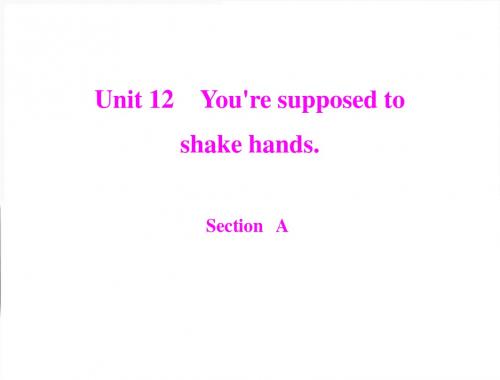
3 . Often we just walk around the town center, seeing as many of our friends as we can!我们经常只是到市中心走走,同
时尽可能多地见见朋友!
(1) 本句中的 seeing as many of our friends as we can 为现在
(1)be supposed to do sth.意为“应该做某事”或“被期望做 某事”。如: You're supposed to look after your parents.
你应该照顾你的父母。
(2)for the first time 为介词短语,意为“首次;第一次”, 在句中作时间状语。如: For the first tiห้องสมุดไป่ตู้e he has to pay attention to his health. 这是第 一次他非得注意自己的健康不可。 (3)shake hands 意为“握手”,shake hands with sb.意为“与 某人握手”。如:
They shook hands with each other and then sat down. 他们握
了握手, 然后坐了下来。
①他们相互握手,然后说再见。
shook ________ hands with each other and said goodbye. They ________ ②当我们在校园遇到老师,应该向他们问好。 supposed are ________ When we meet teachers at school, we ________
①All the students walk towards the school gate, ________
(九年级英语教案)Unit12You'resupposedtoshakehands
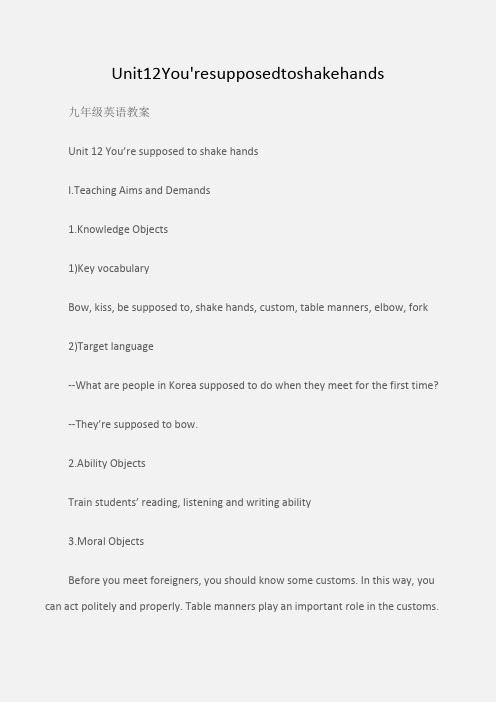
Unit12You'resupposedtoshakehands 九年级英语教案Unit 12 You’re supposed to shake handsI.Teaching Aims and Demands1.Knowledge Objects1)Key vocabularyBow, kiss, be supposed to, shake hands, custom, table manners, elbow, fork2)Target language--What are people in Korea supposed to do when they meet for the first time?--They’re supposed to bow.2.Ability ObjectsTrain students’ reading, listening and writing ability3.Moral ObjectsBefore you meet foreigners, you should know some customs. In this way, you can act politely and properly. Table manners play an important role in the customs.II.Teaching Key Points and Teaching Difficult Points1.Practice reading and writing using target language2.How to write an e-mail message3.Get some information about different customs in different countriesIII.Teaching AidsBlackboard, a tape recorderIV.Teaching ProceduresStep 1: Revision1.In unit 11, we learned some ways of asking for information politely. Now, if you want to go to a restroom, how can you ask?1)Do you know where I can find a restroom?2)Could you tell me how to get to the restroom?3)Would you please tell me where the restroom is?2.Discuss things that are good / bad to do in the school. Fill the blankRightCome to class on timeRaise your hands before talking。
九年级英语全册 Unit 12 You’re supposed to shake hands Sec
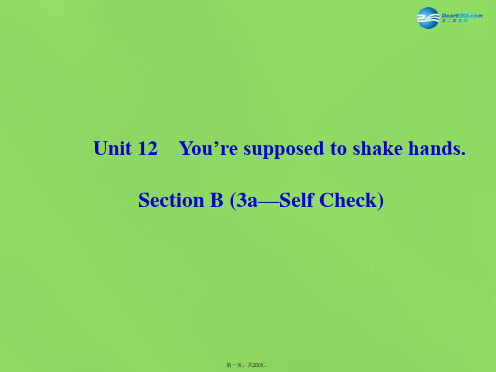
Ⅰ. 根据句意及图片(túpiàn)提示完成单词
1. I need two
of honey.
2. In a Western restaurant, you have to eat with a
,a
and a spoon.
答案: 1. spoons 2. fork; knife
第二十页,共23页。
3. —Would you like another hamburger?
adj. to do
第十二页,共23页。
【温馨提示(tíshì)】 跟it作形式宾语的动词还有: think, believe, know, feel, make等。例如:
I think it necessary to help each other. 我认为有必要互相帮助。
第十三页,共23页。
【活学活用】
第三页,共23页。
Ⅱ. 阅读短文内容(nèiróng), 判断正误(T/F) ( )1. The e-mail is from Wang Kun to Laura. ( )2. Laura is having a great time on the exchange program in France. ( )3. In France, you are not supposed to put your bread on the table. ( )4. It’s very rude to say you are full in France. ( )5. In France, you should always keep your hands on the table while having dinner. 答案: 1~5. TFFTT
人教版新目标九年级全册Unit 12 You`re supposed to shake hands. Period 3课件

2) chopstick是由 chop(砍)+stick(棍子)组 成的合成词。意思是 “筷子” , 它通 常以chopsticks复数形式出现。
e.g.
Chinese always use chopsticks to eat, but the English don’t use them. 中国人通常用筷子吃饭, 而英国人不。
∨ drink.
A: In…what are you supposed to do when you eat?
B: We are / aren’t supposed to …
the United States
Korea
China
Peru
Do Romans do when you are in Rome. 入乡随俗
×
In China, you’re not supposed to pick up
× your bowl of rice.
×
In Korea, the youngest people is
supposed to start eating first.
In Brazil, you should wipe your mouth with your napkin every time you take a
2a Listening
Tomorrow Steve is going to Japan to be an exchange student. His Japanese friend Satoshi is telling him about the table manners in Japan. Listen and number the pictures in the order Satoshi talks about them.
九年级英语全册 Unit 12 You are supposed to shake hands.Se
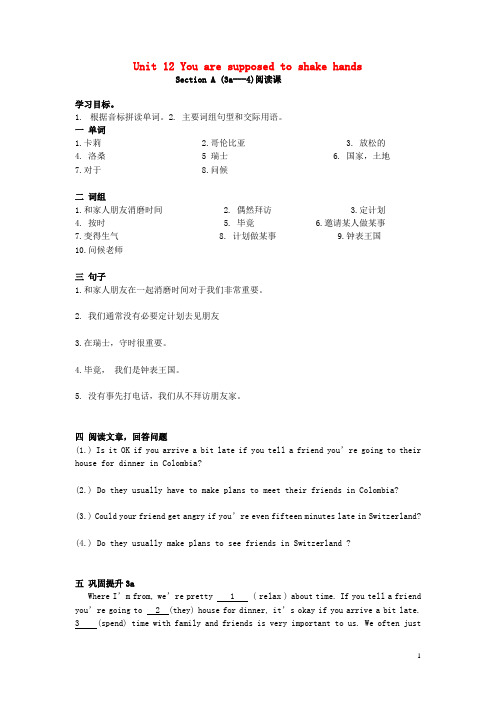
Unit 12 You are supposed to shake handsSection A (3a---4)阅读课学习目标。
1.根据音标拼读单词。
2. 主要词组句型和交际用语。
一单词1.卡莉2.哥伦比亚3. 放松的4. 洛桑 5 瑞士 6. 国家,土地7.对于 8.问候二词组1.和家人朋友消磨时间2. 偶然拜访3.定计划4. 按时5. 毕竟6.邀请某人做某事7.变得生气 8. 计划做某事 9.钟表王国10.问候老师三句子1.和家人朋友在一起消磨时间对于我们非常重要。
2. 我们通常没有必要定计划去见朋友3.在瑞士,守时很重要。
4.毕竟,我们是钟表王国。
5. 没有事先打电话,我们从不拜访朋友家。
四阅读文章,回答问题(1.) Is it OK if you arrive a bit late if you tell a friend you’re going to their house for dinner in Colombia?(2.) Do they usually have to make plans to meet their friends in Colombia?(3.) C ould your friend get angry if you’re even fifteen minutes late in Switzerland?(4.) Do they usually make plans to see friends in Switzerland ?五巩固提升3aWhere I’m from, we’re pretty 1 ( relax ) about time. If you tell a friend you’re going to 2 (they) house for dinner, it’s okay if you arrive a bit late.3 (spend) time with family and friends is very important to us. We often justdrop by our 4 (friend) homes. We don’t usually have to make plans 5 (meet) our friends. Often we just walk around the town center, 6 (see) as many of our friends as we can!In Switzerland, it’s very important 7 (be) on time. We’re the land of 8 (watch), after all! If someone invites you 9 (meet) them at 4:00, you have to be there at 4:00. If you’re even fifteen minutes late, your friend may get angry. Also, we never visit a friend’s house without 10 (call) first. We usually make plans to see friends. We usually plan to do something interesting, or go somewhere together.六用所给词的适当形式填空。
九年级英语全册 Unit 12 You’re supposed to shake hands教案 人教新目标版
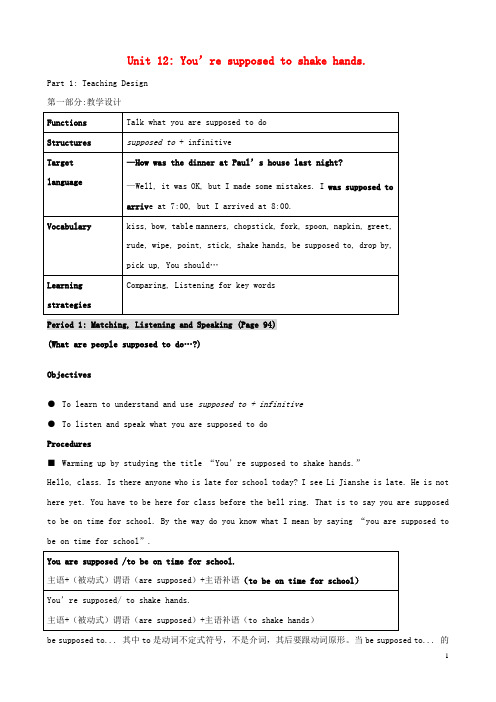
Unit 12: You’re supposed to shake hands.Part 1: Teaching Design第一部分:教学设计Period 1: Matching, Listening and Speaking (Page 94)(What are people supposed to do…?)Objectives●To learn to understand and use supposed to + infinitive●To listen and speak what you are supposed to doProcedures■Warming up by studying the title “You’re supposed to shake hands.”Hello, class. Is there anyone who is late for school today? I see Li Jianshe is late. He is not here yet. You have to be here for class before the bell ring. That is to say you are supposed to be on t ime for school. By the way do you know what I mean by saying “you are supposed to be on time for school”.be supposed to... 其中to是动词不定式符号,不是介词,其后要跟动词原形。
当be supposed to... 的主语是“人”时,意为“应该……”;“被期望……”,它可以用来表示劝告、建议、义务、责任等,相当于情态动词should。
如:Everyone is supposed to wear a seat-belt in the car. 每个人在汽车里都应该系安全带。
九年级英语Unit 12 You’re supposed to shake hands. 人教版(新
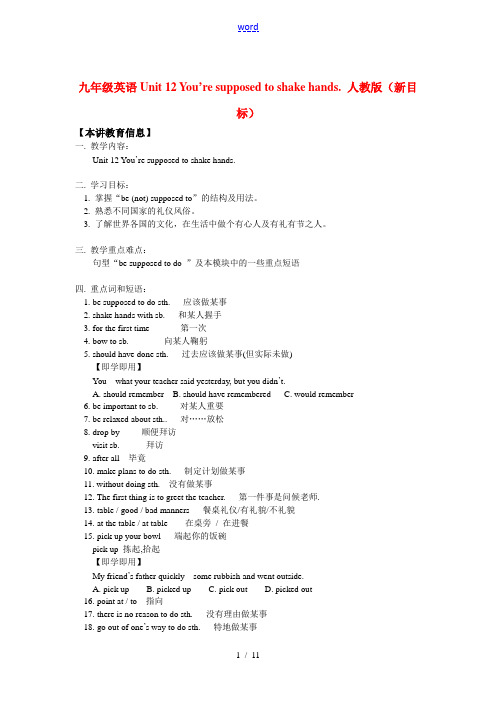
九年级英语Unit 12 You’re supposed to shake hands. 人教版(新目标)【本讲教育信息】一. 教学内容:Unit 12 You’re supposed to shake hands.二. 学习目标:1. 掌握“be (not) supposed to”的结构及用法。
2. 熟悉不同国家的礼仪风俗。
3. 了解世界各国的文化,在生活中做个有心人及有礼有节之人。
三. 教学重点难点:句型“be supposed to do ”及本模块中的一些重点短语四. 重点词和短语:1. be supposed to do sth. 应该做某事2. shake hands with sb. 和某人握手3. for the first time 第一次4. bow to sb. 向某人鞠躬5. should have done sth. 过去应该做某事(但实际未做)【即学即用】You what your teacher said yesterday, but you didn’t.A. should rememberB. should have rememberedC. would remember6. be important to sb. 对某人重要7. be relaxed about sth.. 对……放松8. drop by 顺便拜访visit sb. 拜访9. after all 毕竟10. make plans to do sth. 制定计划做某事11. without doing sth. 没有做某事12. The first thing is to greet the teacher. 第一件事是问候老师.13. table / good / bad manners 餐桌礼仪/有礼貌/不礼貌14. at the table / at table 在桌旁/ 在进餐15. pick up your bowl 端起你的饭碗pick up 拣起,拾起【即学即用】My friend’s father quickly some rubbish and went outside.A. pick upB. picked upC. pick outD. picked out16. point at / to 指向17. there is no reason to do sth. 没有理由做某事18. go out of one’s way to do sth. 特地做某事19. make sb. feel at home 使某人感到不拘束20. be different from 与……不同21. make a toast 敬酒22. older people 长辈23. give pliments 称赞24. make appointments 约会25. behave differently 表现不同26. begin with 从……开始27. not … but…不是……,而是……28. Questions crowded my mind. 我满脑子都是疑问。
九年级英语全册 Unit 12 You’re supposed to shake hands Rea

【归纳(guīnà)拓展】pleased变形记
please
作动词, 意为“使高兴; 使满意”。例如: Nowadays lots of parents always try to please their children. 现 在很多父母总是尽力使他们的孩子高兴。
作形容词, 意为“令人高兴的”, 常用来作表语或定 pleasant 语 , 描 述 事 物 的 特 征 。 例 如 : The trip was very
第二页,共16页。
Ⅱ. 根据短文内容, 完成表格信息(xìnxī)(每空词数不限)
E-mail English
Definition
a new kind of 1 English
Aim
being used to 2
Two 3 of words
abbreviation homophone
When to use
1.
2.
e-mailing a friend or 4
3.
to a 4fr. iend on a phone
答案: 1. written 2. save time/write quickly 3. types
4. sending a message
第三页,共16页。
1. E-mail English is a new kind of written English that is being used to save time. 电子邮件英语是一种(yī zhǒnɡ)新型的被用来节省时间的书面英语。
第十五页,共16页。
3. 比尔说他对演讲比赛的结果感到很满意。 Bill said that he ______ very ______ ______ the result of the speech contest. 4. 如果你上课做鬼脸, 老师会生气的。 If you ______ ______ in class, the teachers will be angry. 5. 学会正确使用电子邮件英语(yīnɡ yǔ)很重要。 ______ important ______ ______ to use e-mail English correctly. 答案: 3. was; pleased with 4. make faces 5. It’s; to learn
九年级英语全册 Unit 12 You are supposed to shake h

Unit 12 You are supposed to shake handsSelf check复习课学习目标:1.根据音标拼读单词。
2. 主要词组和句型。
3. 谈论餐桌礼仪。
学习重难点。
1.重点词组和句型。
2. 谈论餐桌礼仪。
一单词1.不熟悉的2.调羹3.刀,餐刀4. 挤满二词组1.使某人感到宾至如归。
2对某人来说不熟悉。
3习惯某事4.敬酒 5约会 6 称赞7.特别做某事三句子1.感谢你邀请我参加你的生日聚会。
2.所有的问题都涌入了我的头脑中3.正如你所想象的那样,情况与我们国内不一样。
4.他去朋友家之前,会先打一个电话。
5.这些餐桌礼仪你有必要了解。
四单项选择1.Don’t make __________! I’m doing my homework.A. soundB. voiceC.noise.D. sounds2.The little girl pointed _______ the bird in the tree.A. onB. intoC. atD. for3.Look out! The cup is _______ hot water.A full of B. fill with C. full D. fill4.He found _______ very interesting to ride a horse on the farm.A. thisB. thatC. it D .who5.Buses ______ passengers.A. are used to carryingB. are used to carryC. used to carryD. get used to carry五书面表达Chinese Table manners。
九年级英语全册 Unit 12 You’re supposed to shake hands全单元课件 人教新目标版
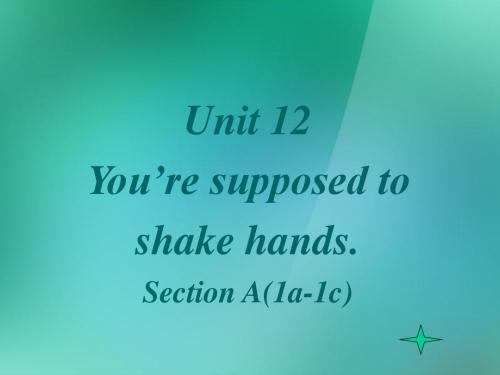
Talk about what people in different countries do when they meet for the first time.
A: What are people in Korea supposed to do
when they meet for the first time?
•
bow:When you bow
to others, you should stand at attention and take off your hat to show your respect(尊重).
kiss: If you meet a friend or your relative, you can greet(问候) him or her with a hug (拥抱) or a kiss on the cheeks(面颊). If you are a couple(夫妇), you can hug and kiss, bldren, you just kiss on the face or forehead(前额). If you are brothers or sisters, you just kiss on the cheeks.
Everyone is supposed to know the law. We’re not supposed to play basketball in the classroom.
Brazil
the United States
Japan
Mexico
Korea
Different countries have different customs(风俗.习惯).
√ √ √
九年级英语-Unit_12_You-re_supposed_to_shake_handsAqqlPK
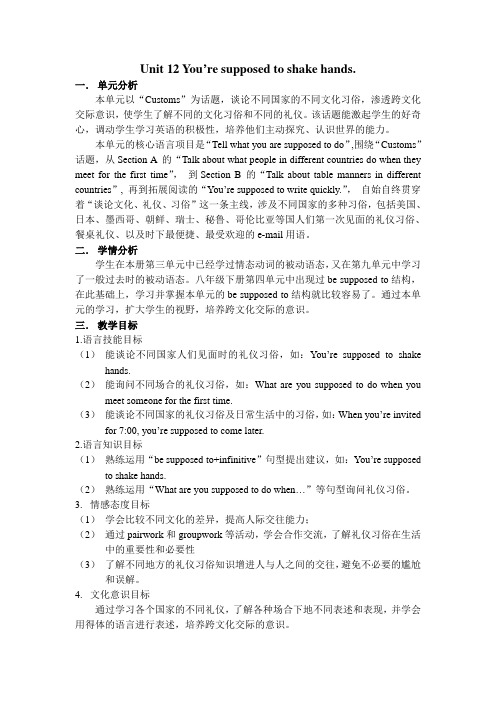
Unit 12 You’re supposed to shake hands.一.单元分析本单元以“Customs”为话题,谈论不同国家的不同文化习俗,渗透跨文化交际意识,使学生了解不同的文化习俗和不同的礼仪。
该话题能激起学生的好奇心,调动学生学习英语的积极性,培养他们主动探究、认识世界的能力。
本单元的核心语言项目是“Tell what you are supposed to do”,围绕“Customs”话题,从Section A 的“Talk about what people in different countries do when they meet for the first time”,到Section B 的“Talk about table manners in different countries”, 再到拓展阅读的“You’re supposed to write quickly.”,自始自终贯穿着“谈论文化、礼仪、习俗”这一条主线,涉及不同国家的多种习俗,包括美国、日本、墨西哥、朝鲜、瑞士、秘鲁、哥伦比亚等国人们第一次见面的礼仪习俗、餐桌礼仪、以及时下最便捷、最受欢迎的e-mail用语。
二.学情分析学生在本册第三单元中已经学过情态动词的被动语态,又在第九单元中学习了一般过去时的被动语态。
八年级下册第四单元中出现过be supposed to结构,在此基础上,学习并掌握本单元的be supposed to结构就比较容易了。
通过本单元的学习,扩大学生的视野,培养跨文化交际的意识。
三.教学目标1.语言技能目标(1)能谈论不同国家人们见面时的礼仪习俗,如:You’re supposed to shake hands.(2)能询问不同场合的礼仪习俗,如:What are you supposed to do when you meet someone for the first time.(3)能谈论不同国家的礼仪习俗及日常生活中的习俗,如:When you’re invited for 7:00, you’re supposed to come later.2.语言知识目标(1)熟练运用“be supposed to+infinitive”句型提出建议,如:You’re supposed to shake hands.(2)熟练运用“What are you supposed to do when…”等句型询问礼仪习俗。
九年级英语全册 Unit 12 You’re supposed to shake hands Sec
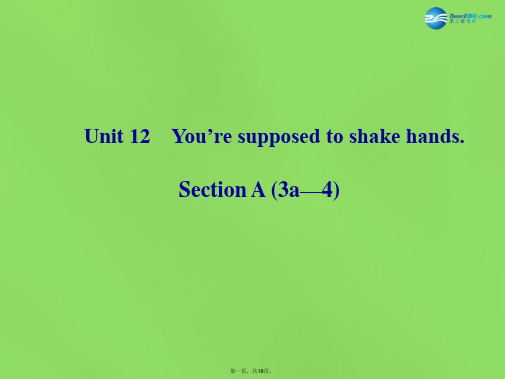
答案: ①a. relaxed b. relax c. relaxing
②
he comes from, people make a living by fishing.
A. What
B. Where
C. When
D. How
第八页,共18页。
2. We often just drop by our friends’ homes. 我们经常只是顺便(shùbiàn)到朋友家拜访。 【自主领悟】drop by意为“顺便(shùbiàn)(或偶然)拜访”, 后常接表示
第十八页,共18页。
A. See
B. Sees C. Seeing
D. Saw
第十六页,共18页。
Ⅱ. 完成句子 1. 他们正在制订假期计划(jìhuà)。 They are______ ______for vacation. 2. 玛丽的朋友常顺便去她家拜访。 Mary’s friends often ______ ______ her house. 3. 别再生气了。毕竟, 他只是个孩子。 Don’t be angry any more. ______ ______, he is only a child. 答案: 1. making plans 2. drop by 3. After all
第四页,共18页。
1. Where I’m from, we’re pretty relaxed about time. 在我们那儿, 对时间的要求相当宽松。 【自主领悟】(1)Where I’m from是地点状语从句, 相当于 in/at/to+the place+where从句, 意为“在……地方(dìfāng)”。 (2)be relaxed about意为“对……随意; 对……宽松”, 后可接名 词、代词或________形式。
九年级英语全册 Unit 12 You’re supposed to shake hands阶段专题
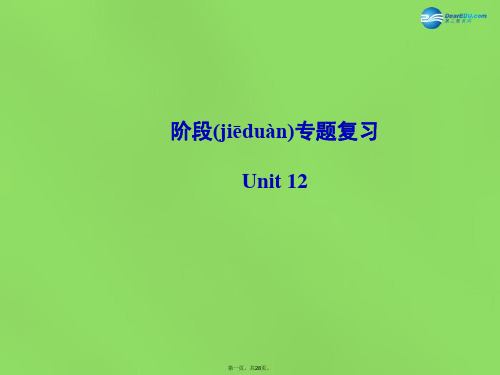
Ⅲ. 句型攻关 1. 在英国, 当你初次遇见某人时, 你应该(yīnggāi)做什么? What______ you ______ ______ do when you meet someone for the first time in England? 2. 你本应该(yīnggāi)先问一下你该带什么礼物。 You ______ ______ ______what present you were supposed to take. 答案: 1. are; supposed to 2. should have asked
(疑问词+
+主语+
to + 动 词 原 形
(yuánxíng)+. . . ? )
答案: 3. 动词原形(yuánxíng) 4. be; supposed
第三页,共28页。
【探究总结】 一. 含义及构成
be supposed to意为“应该; 被期望; 理应”, 用来表示(biǎoshì)根据规
5. 指向
at/to
答案: 1. supposed 2. shake 3. by 4. all 5. point
第十七页,共28页。
6. go out of one’s way to do sth. 7. make sb. feel at home 8. table manners 9. be/get used to 10. learn by oneself 答案: 6. 特地(不怕麻烦地)做某事 7. 使某人感到宾至如归 8. 餐桌礼仪(lǐyí) 9. 习惯于 10. 自学
阶段(jiēduàn)专题复习 Unit 12
第一页,共28页。
- 1、下载文档前请自行甄别文档内容的完整性,平台不提供额外的编辑、内容补充、找答案等附加服务。
- 2、"仅部分预览"的文档,不可在线预览部分如存在完整性等问题,可反馈申请退款(可完整预览的文档不适用该条件!)。
- 3、如文档侵犯您的权益,请联系客服反馈,我们会尽快为您处理(人工客服工作时间:9:00-18:30)。
Boy2: In Mexico we shake hands. Boy3: We bow. Girl2: And in Korea we also bow. Boy1: Well, I guessin most Western countries we shake hands. 1b Listening and checking You are supposed to listen for a second time to check your answers in 1a. Countries 1. c Brazil 2. b the United States 3. a Japan 4. b Mexico 5. a Korea Now you can turn to page 135 to read the tapescript. While reading circle connectives and underline the expressions. 1c Doing pairwork What do people do when they meet for the first time? Now in pairs tell Customs a. bow b. shake hands c. kiss
Supposed to+ infinitive is used?
Whatare yousupposedto dowhen you meet someone? You’re supposedto kiss. You’re not supposedto shake hands.
Whenwere yousupposedto arrive?
Unit 12 You’re supposed to shake hands 教案
Part 1: Teaching design (第一部分:教学设计) Structures:Supposed to+ infinitive Target language: How was the dinner at Paul’s house last night? Well, it was OK, but I made some mistakes. I was supposed to arrive at 7:00, but I arrived at 8:00. Vocabulary: kiss, bow, table manners, chopstick, fork, spoon, napkin, greet, rude, wipe, point, stick, shake hands, be supposed to, drop by, pick up, You should… Learning strategies: Comparing, Listening for key words Section A Goals ●To learn to use the structure Supposed to+ infinitive ●To listen and talk about what people are supposed to do Procedures Warming up by learning about the structure Supposed to+ infinitive Turn to page 95 first. Look at the sentences. Do you see how the structure
each other what you know about meeting for the first time. You are sopposed to use the Supposed to+ infinitive structure, OK?
A: Whatare people in Koreasupposedto dowhen they meet for the first time? B: They ’re supposedto bow. A: Whatare people in the United Statessupposedto dowhen they meet for the first time? B: They ’re supposedto shake hands. A: Whatare people in Chinasupposedto dowhen they meet for the first time? B: They ’re supposedto shake hands. A: Whatare people in Mexicosupposedto dowhen they meet for the first time? B: They ’re supposedto shake hands. A: Whatare people in Brazilsupposedto dowhen they meet for the first time? B: They ’re supposedto kiss. A: Whatare people in your citysupposedto dowhen they meet for the first time?
I wassupposedto arrive at 7:00.
Youshould have askedwhatyou weresupposedto wear. 1a Looking, listening and matching Hello, class. What are we supposed to do next? Yes, you are right. We are going to look, listen and match. Now turn to page 94. Look at the picture and listen to the recording for what people do when they meet for the first time. Tapescript Boy1:What are people supposed to do when they meet in your country, Celia? Girl1: Well, do you mean when friends meet for the first time? Boy1: Yeah. Girl1: Well, in Brazil, friends kiss. Boy1:What about in Mexico, Rodriguez?
